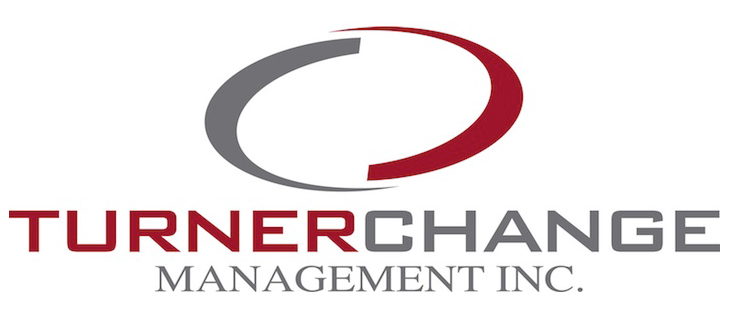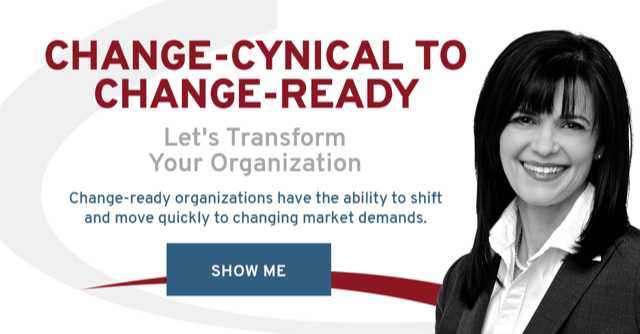Do you have a resistant mindset or a Readiness MindsetTM?
Your beliefs and attitude toward your and your team’s response to change directly affect your organizational change outcomes.
A resistance mindset is based on the belief that people resist change. Leaders who have a resistant mindset try to manage resistance. They react and respond to “negative” feedback as a barrier to overcome.
A readiness mindset is based on the belief that when people feel prepared and supported, they will move toward change. A readiness mindset sets you up for success because it is proactive and affirmative. Leaders who have a readiness mindsettm focus on building their team and their organization’s strengths to enable healthy, sustainable change.
Resistance is a Symptom
Many leaders and articles talk about a particular person or group of people as “resistant to change.” People talk about resistance to change as an inevitable part of the change process or a personality or group trait. I frequently hear leaders say, “I like change, but my employees don’t.” As if they are somehow different or more agreeable to change than their employees. The reality is that leaders are more agreeable to the change because they usually decided to implement the change.
When I work with leaders and employees, I ask them to tell me about a time they “resisted” a change. Then I ask them to identify why they resisted and one action they took as a result.
Whether it’s a CEO or a frontline employee, the results are the same. They talk about not believing the change was needed or not having enough information. Some people perceived the change as too high a risk and that it didn’t work before. Others experienced inconsistent messaging. None of the reasons they give indicate that resistance to change is either a psychological state or a phase of the change process. Their “resistance” was always due to a condition or factor within the control of the change leaders or initiators.
What leaders call resistance to change is a symptom. It signals an unresolved issue or problem that people manifest in action, behaviour, or attitude. Worse, it has become a convenient label applied to any person or group that doesn’t respond to the change event as expected or desired.
The symptoms that often get labelled as resistance are part of our typical reaction to change. We are not wired to immediately, without question, accept every new condition in our environment. And it’s our normal human reaction to change that has further entrenched the erroneous belief that people resist change.
The Reaction is not Resistance
Our brain’s sole purpose is the same as it was 100,000 years ago—to keep us alive. And our brain uses the same mechanisms today as it did back then.
One of these mechanisms is our ability to quickly and automatically (below our conscious level of thought) assess our environment and react to any perceived threat. And we can do it at breakneck speed. We do it so fast and without conscious awareness that we can assess and respond to a situation 500 milli-seconds sooner than our executive centre (conscious brain) can even recognize something has occurred[1]. That’s why you can say something, in the heat of the moment, only to wish you had said something different a few seconds later.
The need for consistency and predictability is another built-in survival mechanism. Uncertainty and the fear of the unknown are two of the most stressful things for every human being[2]. Dr. Sarah McKay, a neuroscientist in Australia, notes we are constantly and unconsciously on a moment-by-moment basis assessing every thought, feeling, and action to determine what’s going to happen next.
 This ability to quickly assess and predict has one drawback that significantly impacts your organizational change efforts. The problem is we base our assessment and prediction on previously learned behaviours, beliefs, perceptions, and experiences. And we do it automatically without the help, supervision, or awareness of our logical conscious mind[3]. It’s one reason long-term employees are quick to bring up what went wrong with a previous change.
This ability to quickly assess and predict has one drawback that significantly impacts your organizational change efforts. The problem is we base our assessment and prediction on previously learned behaviours, beliefs, perceptions, and experiences. And we do it automatically without the help, supervision, or awareness of our logical conscious mind[3]. It’s one reason long-term employees are quick to bring up what went wrong with a previous change.
To further aid in our survival, we also come equipped with a built-in negativity bias. This built-in bias means we are pre-programmed and conditioned to perceive what’s wrong with a situation first. That’s why when you initially announce a change, many of the first comments you hear are why it won’t work, questions about its validity or necessity, and other statements or observations that point out what’s wrong with your proposed change.
These comments, questions, and behaviours are normal human reactions to anything new, different, or unexpected, but they are not resistant to change. Whether the reactions or worse, the people get labelled as resistant to change depends on mindset.
Mindset Determines How We Interpret Our World
If we had to manage every aspect of our environment on a minute-by-minute basis, we would quickly become overwhelmed. Our mindset helps to prevent that.
Mindset is defined as a mental frame or lens that selectively organizes and encodes information[1]. It orientates us toward a unique understanding of an experience and guides our responses and actions. That’s what makes mindset so powerful; it’s the filter through which we organize our world.
Therefore, if you believe people resist change (a resistant mindset), it’s easy to misinterpret a normal human reaction to change is resistance. That’s because, with a resistance mindset, you hear the comments, complaints, and questions about the change as negative. These negative comments, lack of participation, or questioning become pushback and evidence supporting your belief that people resist change. Thus you create the resistance you must then try to manage.
A Readiness Mindset Breaks the Cycle of Resistance to change
A readiness mindset breaks this cycle and opens new possibilities for healthy organizational change. Eric Dent and Susan Goldberg of George Washington University wrote in 1999, “the belief that people do resist change causes all kinds of unproductive actions within organizations.”
A readiness mindsetTM is grounded in the belief that all of us are built for change. We will move toward something new or different if we believe change is needed, feel prepared, capable, and supported.
When we adopt a readiness mindsettm, we make time to understand the normal human response to change. We explore the reactions, questions, and behaviours with curiosity and the opportunity to prepare and support our team through the change process.
Because they hear the reactions from a readiness perspective, they ask different questions. As a result, they elicit a completely different response from those who need to do the heavy lifting to achieve the new environment.
When you approach change with a readiness mindsettm, those same comments or questions are not negative or positive; they are simply information. The statements and questions give you insight into your team’s understanding, knowledge, previous history, and preparedness.
Learning to cultivate a readiness mindsettm when enabling change in your organization doesn’t mean everyone will accept every change you initiate—we are not built that way as humans. But it will lead to engaged employees, higher levels of adoption, a greater return on investment, and increased capability to handle future changes.
Where there is readiness, resistance can’t exist.
This blog post was adapted from our latest Whitepaper “The Power of the Readiness Mindsettm.”
References
[1] Crum, A., Salvoy, P., & Achor, S. (2013). Re-thinking Stress: The role of mindset in determining the stress response. Journal of Personality and Social Psychology, 104(4), 716. doi:10.1037/a0031201
[1] Watkins, A. (2014). Coherence: The Secret Science of Brilliant Leadership London United Kingdom: Kogan Page Limited.
[2] McKay, S. (2020). The Uncertain Brain. A Guide to Facing The Fear of the Unknown. Retrieved from https://drsarahmckay.com/the-uncertain-brain-a-guide-to-facing-the-fear-of-the-unknown/
[3] Lipton, B. (2005). The Biology of Belief. California: Hay House.



